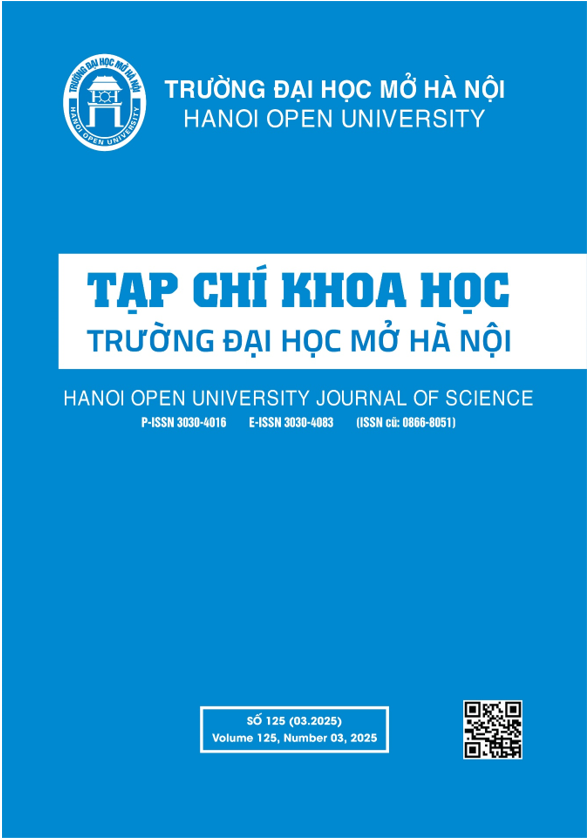THE FACTORS AFFECTING STUDENTS' INTENTION TO PARTICIPATE IN TRAINING AND DEVELOPMENT PROGRAMS ON DIGITAL AND TECHNOLOGICAL SKILLS AT CAN THO UNIVERSITY OF TECHNOLOGY
DOI:
https://doi.org/10.59266/houjs.2025.549Từ khóa:
Can Tho University of Technology, digital skills, intention to participate, technological skills, trainingTóm tắt
This study investigates the factors affecting students' intention to participate in training and development programs on Digital and Technological skills at Can Tho University of Technology. Using a survey of 339 students, the study employs reliability testing, exploratory factor analysis (EFA), and Partial Least Squares Structural Equation Modeling (PLS-SEM) to analyze the data. The results reveal that Cost and Time, Expected Benefits, and Learning Environment significantly and positively impact students' intention to participate, while Perceived Importance of Digital Skills, Confidence in Learning Digital Skills, and Support from University and Family show no statistically significant effects. The model explains 59.1% of the variance in students' intention to participate, demonstrating a strong explanatory capacity. This study contributes to the understanding of factors influencing training participation and provides actionable insights for educational institutions in the digital age.
Tài liệu tham khảo
[1]. Ajzen, I. (1991). The Theory of Planned Behavior. Organizational Behavior and Human Decision Processes, 50(2), 179-211.
[2]. Ajzen, I & Fishbein, M. (1975). Belief, Attitude, Intention, and Behavior: An Introduction to Theory and Research. Addison-Wesley.
[3]. Altbach, P. G., Reisberg, L., & Rumbley, L. E. (2009). Trends in Global Higher Education: Tracking an Academic Revolution. UNESCO, Paris.
[4]. Bandura, A. (1986). Social Foundations of Thought and Action: A Social Cognitive Theory. Prentice-Hall.
[5]. Compeau, D. R., & Higgins, C. A. (1995). Computer Self-Efficacy: Development of a measure and Initial Test. MIS Quarterly, 19(2), 189-211.
[6]. Davis, F. D. (1989). Perceived Usefulness, Perceived Ease of Use, and User Acceptance of Information Technology. MIS Quarterly, 13(3), 319-340.
[7]. Henseler, J., Hubona, G., & Ray, P. A. (2014). Using PLS path modeling in new technology research: Updated guidelines. Industrial Management & Data Systems, 116(1), 2-20. https://doi. org/10.1108/IMDS-09-2015-0382.
[8]. Hofstede, G. (2001). Culture’s consequences: Comparing values, behaviors, institutions, and organizations across nations (2nd ed.). Thousand Oaks, CA: Sage Publications.
[9]. Hung, S.-Y., Chang, C.-M., & Lee, M.-F. (2010). Factors Influencing the Adoption of E-Learning among Employees: An Empirical Study in Taiwan. International Journal of Human-Computer Interaction, 26(1), 1-23.
[10]. Lin, J.-C., & Lu, H. (2010). Towards an understanding of the behavioral intention to use a website. International Journal of Information Management, 20(3), 197-208.
[11]. Mayer, R. E. (2021). Digital and technological skills training: Building capabilities for the modern workplace. New York, NY: Springer.
[12]. Mezirow, J. (2000). Learning as transformation: Critical perspectives on a theory in progress. San Francisco, CA: Jossey-Bass.
[13]. Moore, M. G., & Kearsley, G. (2011). Distance Education: A Systems View of Online Learning. Belmont, CA: Wadsworth.
[14]. Nguyen, T. T. H. (2020). Nghien cuu cac yeu to anh huong den y dinh tham gia hoc tap ky nang so cua sinh vien Viet Nam. Tap chi Khoa hoc va Cong nghe. Dai hoc Quoc gia TP.HCM.
[15]. Nguyen, D. T. (2011). Phuong phap nghien cuu khoa hoc trong kinh doanh: Thiet ke va thuc hien. NXB Lao dong - Xa hoi.
[16]. Rogers, E. M. (1962). Diffusion of Innovations. Free Press.
[17]. Selwyn, N. (2007). The use of computer technology in university teaching and learning: A critical perspective. Journal of Computer Assisted Learning, 23(2), 83-94.
[18]. Tan, M., & Teo, T. S. H. (2000). Factors influencing the adoption of Internet banking. Journal of the Association for Information Systems, 1(1), 1-42.
[19]. Venkatesh, V., Morris, M. G., Davis, G. B., & Davis, F. D. (2003). User Acceptance of Information Technology: Toward a Unified View. MIS Quarterly, 27(3), 425-478.
[20]. Wang, Y., Wu, M., & Wang, H. (2015). Investigating the determinants and age and gender differences in the acceptance of mobile learning. British Journal of Educational Technology, 46(4), 769-778.
